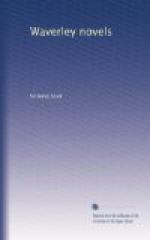Our bootless host of high-born
beggars,
Mac-Leans, Mac-Kenzies, and
Mac-Gregors.’
Waverley expressed his regret at the interruption.
’O you cannot guess how much you have lost! The bard, as in duty bound, has addressed three long stanzas to Vich Ian Vohr of the Banners, enumerating all his great properties, and not forgetting his being a cheerer of the harper and bard—“a giver of bounteous gifts.” Besides, you should have heard a practical admonition to the fair-haired son of the stranger, who lives in the land where the grass is always green—the rider on the shining pampered steed, whose hue is like the raven, and whose neigh is like the scream of the eagle for battle. This valiant horseman is affectionately conjured to remember that his ancestors were distinguished by their loyalty as well as by their courage. All this you have lost; but, since your curiosity is not satisfied, I judge, from the distant sound of my brother’s whistle, I may have time to sing the concluding stanzas before he comes to laugh at my translation.’
Awake on your hills, on your
islands awake,
Brave sons of the mountain,
the frith, and the lake!
’T is the bugle—but
not for the chase is the call;
’T is the pibroch’s
shrill summons—but not to the hall.
’T is the summons of
heroes for conquest or death,
When the banners are blazing
on mountain and heath:
They call to the dirk, the
claymore, and the targe,
To the march and the muster,
the line and the charge.
Be the brand of each chieftain
like Fin’s in his ire!
May the blood through his
veins flow like currents of fire!
Burst the base foreign yoke
as your sires did of yore,
Or die like your sires, and
endure it no more!
CHAPTER XXIII
WAVEELEY CONTINUES AT GLENNAQUOICH
As Flora concluded her song, Fergus stood before them. ’I knew I should find you here, even without the assistance of my friend Bran. A simple and unsublimed taste now, like my own, would prefer a jet d’eau at Versailles to this cascade, with all its accompaniments of rock and roar; but this is Flora’s Parnassus, Captain Waverley, and that fountain her Helicon. It would be greatly for the benefit of my cellar if she could teach her coadjutor, Mac-Murrough, the value of its influence: he has just drunk a pint of usquebaugh to correct, he said, the coldness of the claret. Let me try its virtues.’ He sipped a little water in the hollow of his hand, and immediately commenced, with a theatrical air,—
’O Lady of the desert,
hail!
That lovest the harping
of the Gael,
Through fair and fertile
regions borne,
Where never yet grew
grass or corn.
But English poetry will never succeed under the influence of a Highland Helicon. Allons, courage!
O vous, qui buvez, a tasse
pleine,
A cette heureuse f ontaine,
Ou on ne voit, sur le rivage,
Que quelques vilains
troupeaux,
Suivis de nymphes de village,
Qui les escortent
sans sabots—’




